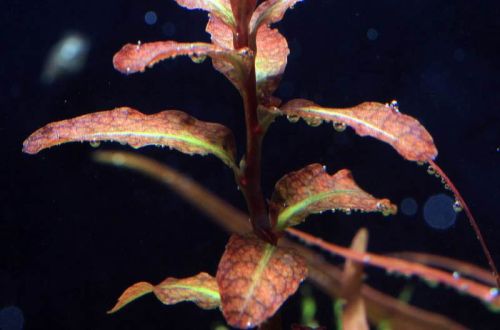
Persicaria Sao Paulo
Persicaria Sao Paulo, scientific name Persicaria sp. Sao Paulo. The plant is native to South America. It was first collected near the city of Sao Paulo, from which it got its name. The exact species affiliation is unknown, so in some sources it is designated as Polygonum sp. Sao Paulo.
In an aquarium, under favorable conditions, it forms a long tall stem with alternately arranged leaves (about 12,5 cm long and 2 cm wide). The leaf blade is elongated lanceolate. The color of the stems and leaves is purple.
Can grow above water in moist substrates. In the air, the color of the leaves acquires purple or reddish hues. It blooms with tiny white flowers, located on a long arrow.
Outwardly, it is almost identical to another species – Red Persicaria (Persicaria sp. “Kawagoeanum”), which is why they are often confused when selling. Both plants can be distinguished by the following set of features.
Persicaria sp. “Kawagoean”
the leaves located in the upper part of the stem are red, the lower ones are with a predominance of green hues;
young leaves tend upward in the direction of the stem;
leaf blade longer linear shape;
the plant forms many side shoots;
tends to grow horizontally.
persicaria sp. “Sao Paulo”
young and old leaves have the same purple color along the entire stem (in bright light);
young leaves “look down”;
sheet plastic of a lanceolate form;
side shoots are not so numerous, the bushes look thinned out;
always grows vertically upwards.
Not demanding on growing conditions. However, the best appearance is achieved in bright light, with regular introduction of carbon dioxide, high concentrations of trace elements such as iron and phosphate (1 mg/l or more). In low light, as in the case of Persicaria red, the lower leaves will turn greenish with a pink tint.
In aquariums, it is desirable to place in the center or in the background. Each sprout should have free space around. A common mistake novice aquarists make is to place the São Paulo Persicaria in dense thickets. In such cramped conditions, weak sprouts quickly wither.




